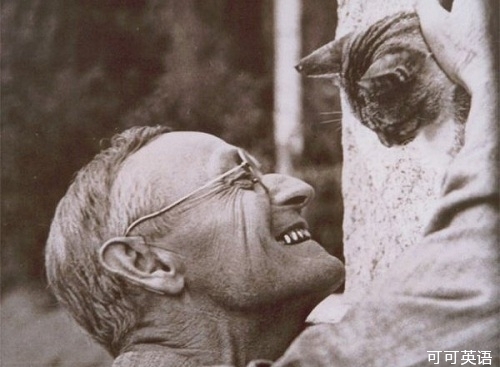(单词翻译:单击)
名著阅读
At times he felt, deep in his chest, a dying, quiet voice, which admonished him quietly, lamented quietly; he hardly perceived it. And then, for an hour, he became aware of the strange life he was leading, of him doing lots of things which were only a game, of, though being happy and feeling joy at times, real life still passing him by and not touching him. As a ball-player plays with his balls, he played with his business-deals, with the people around him, watched them, found amusement in them; with his heart, with the source of his being, he was not with them. The source ran somewhere, far away from him, ran and ran invisibly, had nothing to do with his life any more. And at several times he suddenly became scared on account of such thoughts and wished that he would also be gifted with the ability to participate in all of this childlike-naive occupations of the daytime with passion and with his heart, really to live, really to act, really to enjoy and to live instead of just standing by as a spectator. Butagain and again, he came back to beautiful Kamala, learned the art of love, practised the cult of lust, in which more than in anything else giving and taking becomes one, chatted with her, learned from her, gave her advice, received advice. She understood him better than Govinda used to understand him, she was more similar to him.
Once, he said to her: "You are like me, you are different from most people. You are Kamala, nothing else, and inside of you, there is a peace and refuge, to which you can go at every hour of the day and be at home at yourself, as I can also do. Few people have this, and yet all could have it."
"Not all people are smart," said Kamala.
"No," said Siddhartha, "that's not the reason why. Kamaswami is just as smart as I, and still has no refuge in himself. Others have it, who are small children with respect to their mind. Most people, Kamala, are like a falling leaf, which is blown and is turning around through the air, and wavers, and tumbles to the ground. But others, a few, are like stars, they go on a fixed course, no wind reaches them, in themselves they have their law and their course. Among all the learned men and Samanas, of which I knew many, there was one of this kind, a perfected one, I'll never be able to forget him. It is that Gotama, the exalted one, who is spreading that teachings. Thousands of followers are listening to his teachings every day, follow his instructions every hour, but they are all falling leaves, not in themselves they have teachings and a law."
Kamala looked at him with a smile. "Again, you're talking about him," she said, "again, you're having a Samana's thoughts."
有时,他感到胸膛深处有一种衰亡的微弱声音,轻声提醒,轻声抱怨,几乎听不清。后来他开始意识到自己过的是一种奇怪的生活,他所做的事只是一种游戏,他很愉快,感到很快乐,但真正的生活却从身边流逝了,并没有触及他。就像一个球员玩球一样他拿他的生意来玩耍,与他周围的人玩耍,观察他们,跟他们寻开心,而他的心、他的生命的源泉却并不在那儿。这源泉流向了某个地方,离他很远走高飞,渐渐看不到了,不再与他的生活相关。有几次,他由于这样的想法而吓了一跳,希望自己也能满腔热忱、全心全意地参与日常的这些孩子般的行动,真正地生活,真正地做事,真正地享受和生活,而不仅仅是作为旁观者站在一边。他经常去拜访美丽的卡玛拉,学习爱情技巧,崇拜性满足,奉献和索取在这儿比在任何地方都更加合而为一。他跟卡玛拉闲聊,向她学习,给她出主意,也接受她的忠告。而卡玛拉也更加了解他,甚至胜过了当初戈文达对他的了解,她跟他更加相似了。
有一次他对卡玛拉说:"你像我一样,跟大多数人不同你是卡玛拉,而不是别人,在你内心有一种沉静,那是个避难所,你随时都可以躲进去,就像到了家一样,我也是这样。只有为数不多的人会这样,但大家也可能学会。"
"并不是所有人都聪明。"卡玛拉说。
"不,"席特哈尔塔说,"关键并不在这里。卡马斯瓦密像我一样聪明,可是他心里就没有避难所。其他人有,但是在智力上却是小孩子。卡玛拉,大多数人都好像一片落叶,在空中飘舞、翻卷,摇摇摆摆地落到地面上。可是也有一些人,为数不多的一些人,却像沿着一条固定轨道运行的星星,没有风吹到它们,它们有自身的规律和轨道。我认识不少学者和沙门,但其中只有一个是这种类型的完人,我永远也忘不了。那就是戈塔马,那个活佛,那个讲经的人。每天都有成千的信徒听他讲经,听他的每一堂课,可他们全都是飘落的树叶,自己内心并没有学说和规律。"
卡玛拉含笑注视着他。"你又在说他了,"她说,"你又回到沙门的想法去了。"
背景阅读

本书简介:
古印度贵族青年悉达多英俊聪慧,拥有人们羡慕的一切。为了追求心灵的安宁,他孤身一人展开了求道之旅。他在舍卫城聆听佛陀乔答摩宣讲教义,在繁华的大城中结识了名妓伽摩拉,并成为一名富商。心灵与肉体的享受达到顶峰,却让他对自己厌倦、鄙弃到极点。在与伽摩拉最后一次欢爱之后,他抛弃了自己所有世俗的一切,来到那河边,想结束自己的生命。在那最绝望的一刹那,他突然听到了生命之河永恒的声音……经过几乎一生的追求,悉达多终于体验到万事万物的圆融统一,所有生命的不可摧毁的本性,并最终将自我融入了瞬间的永恒之中。
作者简介:
赫尔曼·黑塞(Hermann Hesse,1877.7.2-1962.8.9)德国作家。1923年46岁入瑞士籍。1946年获诺贝尔文学奖。1962年于瑞士家中去世。爱好音乐与绘画,是一位漂泊、孤独、隐逸的诗人。黑塞的诗有很多充满了浪漫气息,从他的最初诗集《浪漫之歌》的书名,也可以看出他深受德国浪漫主义诗人的影响,以致后来被人称为“德国浪漫派最后的一个骑士”。主要作品有《彼得·卡门青》、《荒原狼》、《东方之行》、《玻璃球游戏》等。
主要生平及创作
出生于德国西南部的小城卡尔夫的一个牧师家庭。自幼在浓重的宗教气氛中长大,1891年,他通过“邦试”,考入毛尔布隆神学校。由于不堪忍受经院教育的摧残,半年后逃离学校。这期间他游历许多城市,从事过多种职业。
在比较广泛地接受东西方文化熏陶之后,1904年,黑塞发表了长篇小说《彼得·卡门青特》,一举成名,从此成为专业作家。这一年他与玛丽结婚,移居巴登湖畔,埋头写作,1906年发表了长篇小说《在轮下》。这一时期的创作以浪漫主义诗歌、田园诗风格的抒情小说和流浪汉小说为主,作品洋溢着对童年和乡土的思念之情,充满对广大自然和人类的爱,同时也表现了青年人的精神苦闷与追求。
第一次世界大战后,黑塞的创作发生了明显的变化,他醉心于尼采哲学,求助于印度佛教和中国的老庄哲学,并对荣格的精神分析产生了深厚的兴趣。他试图从宗教、哲学和心理学方面探索人类精神解放的途径。这时期的长篇小说有《克努尔普》(1916)、《德米安》(1919)、《席特哈尔塔》(1922)、《荒原狼》(1927)和《纳尔齐斯与歌尔德蒙》(1930)等。这些书深受西方读者的喜爱,得到极高的评价,其中《荒原狼》曾轰动欧美,被托马斯·曼誉为德国的《尤利西斯》。
30年代后,法西斯在德国猖獗,黑塞对社会前途陷入深深的怀疑与绝望之中,但他仍不倦地从东西方宗教与哲学中寻求理想世界,《东方之行》(1932)、《玻璃球游戏》(1943)正是这一时期追求与探索的结晶。
黑塞被雨果·巴尔称为德国浪漫派最后一位骑士,这说明他在艺术上深受浪漫主义诗歌的影响。他热爱大自然,厌倦都市文明,作品多采用象征手法,文笔优美细腻;由于受精神分析影响,他的作品着重在精神领域里进行挖掘探索,无畏而诚实地剖析内心,因此他的小说具有心理的深度。1946年,"由于他的富于灵感的作品具有遒劲的气势和洞察力,也为崇高的人道主义理想和高尚风格提供一个范例",黑塞获诺贝尔文学奖。


